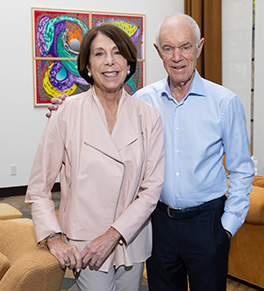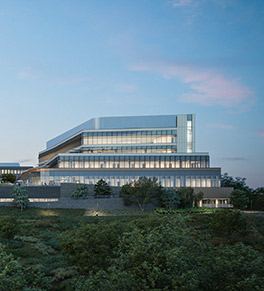
Meningioma
A meningioma is a tumor that grows in the membranes protecting your brain. We’ll create personalized treatments for you after our diagnosis.
Fortunately, the great majority of meningioma tumors are slow growing.
But if it becomes large enough to create complications, treatment can restore your quality of life.
Signs or symptoms of meningioma
You might have a meningioma for some time before you notice any symptoms.
If the tumor grows large enough, it can disrupt your vision, language comprehension or create other issues. The type of symptoms that emerge depend on where the tumor is growing in your brain.
Symptoms may include:
- Vision or hearing loss
- Bursts of abnormal electrical activity in the brain (seizures)
- Trouble thinking clearly
- Headaches
- Trouble walking
- Loss of smell
- Loss of sensation in your arms or legs
- Nausea and vomiting
When to seek care
Be on the lookout for vision loss, headaches or muscle weakness in the arms or legs. If you start to experience any of these symptoms, go to the emergency room.

Find a cancer clinical trial
Talk to your doctor to see if a cancer clinical trial is right for you.
Featured Blog Posts

A 'dream come true' realized in Irvine
Dr. Michael J. Stamos once envisioned opening a small cancer center on the UC Irvine campus. What has emerged, he says, is so much more.

Devoted donors pay it forward

Reimagining cancer care for all of Orange County
When it opens July 16, the Chao Family Comprehensive Cancer Center’s newest location will offer superior care, comfort and convenience.
Types of meningioma
We classify meningioma into three grades, grade I, II and III. Grade I meningiomas are the most common and the most slow-growing. Not all meningioma tumors grow slowly, but 80% of them do.Our approach to a meningioma diagnosis
Our laser focus on brain tumors has given us a unique depth of expertise. We take a multi-specialty approach to your care and work with physicians with specialized training and decades of experience.
Our multidisciplinary approach is important for this condition. Because meningiomas grow so slowly, we strategize with our colleagues about what’s best for you. We decide if and when you need to have surgery, radiation or targeted agents, and we tailor our recommendations to your preferences.
Even though it’s slow, meningioma grows on complex areas of the brain or spinal cord. Our skilled neurosurgeons specialize in precision skull base surgery, providing expert care for even the most complicated meningioma cases.
Our diagnostic tests
Our brain disorder specialists, including radiologists and pathologists, meet with our brain tumor experts every week. They’ll review your test results together. You may need one or more diagnostic tests.
Meningioma treatment at UCI Health
How to work with us
We discover brain tumors in several ways. A severe symptom like vision loss or a debilitating headache may send you to the emergency room. If the ER doctor finds a suspicious lesion from an imaging scan, they may refer you to our program.
Or you may visit your primary care doctor with symptoms and they might send you to us. Sometimes we discover a lesion as an incidental finding. For example, we may spot a tumor from taking an MRI after a car accident or other unrelated event.
Second opinions are an important practice for an accurate diagnosis. You are welcome to reach out anytime to the UCI Health Comprehensive Brain Tumor Program to get a second opinion.
Why choose UCI Health for meningioma care?
We have the largest and most experienced brain tumor team in Orange County.
We work collaboratively to tackle even the most complex cases. In fact, our tumor board consists of 50+ cross-disciplinary experts who meet weekly. Together we plan a tailored, highly personalized care program for you and our other patients.
We care for any tumor.
That includes slow growing wait-and-see cases to the most malignant and aggressive cancers. We also specialize in diagnosing and treating the majority of rare brain tumors.
Our clinical trials lead the way.
Our participation in clinical trials for rare tumors has led to the approval of a number of drugs, establishing a new standard of care.
We’ll automatically consider you for our brain tumor clinical trials. If you qualify, you may receive novel treatments not widely available elsewhere. Your participation also greatly helps future brain tumor patients.
Your referring physician trusts our recommendations.
Doctors understand the value of a second opinion. Our team includes experts from every area of brain tumor care to be able to offer accurate diagnoses.
We collaborate with other specialists.
We’ve formed fruitful collaborations with specialists in genetics, pediatrics and developmental specialists. This helps us address the needs of those patients, also a large part of our practice.
Upcoming Events
6-2 a.m.
Ride, run and walk for cancer research
Korean Women's Cancer Support Group
The UCI Health Korean Women’s Support Group provides help and support for Korean-speaking women who are coping with a cancer diagnosis.
4-5 p.m. +7 more dates
Young Adult Cancer Support Group
The Young Adult Cancer Support Group provides help and support for individuals with cancer between the ages of 18 and 35 receiving active cancer treatment.




